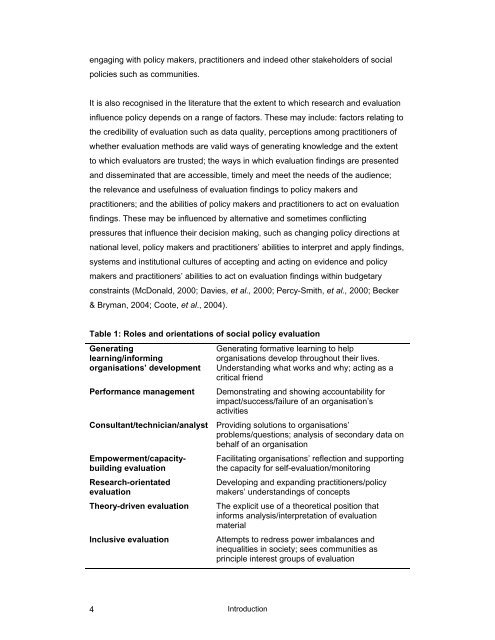Local Evaluation of Children's Services Learning from the Children's ...
Local Evaluation of Children's Services Learning from the Children's ...
Local Evaluation of Children's Services Learning from the Children's ...
- No tags were found...
Create successful ePaper yourself
Turn your PDF publications into a flip-book with our unique Google optimized e-Paper software.
engaging with policy makers, practitioners and indeed o<strong>the</strong>r stakeholders <strong>of</strong> socialpolicies such as communities.It is also recognised in <strong>the</strong> literature that <strong>the</strong> extent to which research and evaluationinfluence policy depends on a range <strong>of</strong> factors. These may include: factors relating to<strong>the</strong> credibility <strong>of</strong> evaluation such as data quality, perceptions among practitioners <strong>of</strong>whe<strong>the</strong>r evaluation methods are valid ways <strong>of</strong> generating knowledge and <strong>the</strong> extentto which evaluators are trusted; <strong>the</strong> ways in which evaluation findings are presentedand disseminated that are accessible, timely and meet <strong>the</strong> needs <strong>of</strong> <strong>the</strong> audience;<strong>the</strong> relevance and usefulness <strong>of</strong> evaluation findings to policy makers andpractitioners; and <strong>the</strong> abilities <strong>of</strong> policy makers and practitioners to act on evaluationfindings. These may be influenced by alternative and sometimes conflictingpressures that influence <strong>the</strong>ir decision making, such as changing policy directions atnational level, policy makers and practitioners’ abilities to interpret and apply findings,systems and institutional cultures <strong>of</strong> accepting and acting on evidence and policymakers and practitioners’ abilities to act on evaluation findings within budgetaryconstraints (McDonald, 2000; Davies, et al., 2000; Percy-Smith, et al., 2000; Becker& Bryman, 2004; Coote, et al., 2004).Table 1: Roles and orientations <strong>of</strong> social policy evaluationGeneratinglearning/informingorganisations’ developmentPerformance managementConsultant/technician/analystEmpowerment/capacitybuildingevaluationResearch-orientatedevaluationTheory-driven evaluationInclusive evaluationGenerating formative learning to helporganisations develop throughout <strong>the</strong>ir lives.Understanding what works and why; acting as acritical friendDemonstrating and showing accountability forimpact/success/failure <strong>of</strong> an organisation’sactivitiesProviding solutions to organisations’problems/questions; analysis <strong>of</strong> secondary data onbehalf <strong>of</strong> an organisationFacilitating organisations’ reflection and supporting<strong>the</strong> capacity for self-evaluation/monitoringDeveloping and expanding practitioners/policymakers’ understandings <strong>of</strong> conceptsThe explicit use <strong>of</strong> a <strong>the</strong>oretical position thatinforms analysis/interpretation <strong>of</strong> evaluationmaterialAttempts to redress power imbalances andinequalities in society; sees communities asprinciple interest groups <strong>of</strong> evaluation4Introduction
















